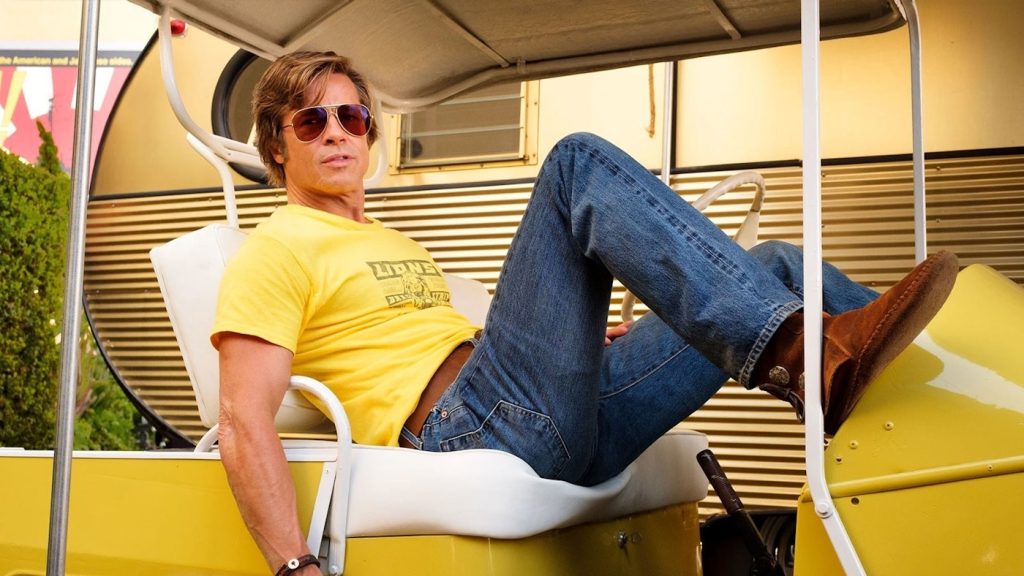
Across his career, Brad Pitt has walked an incredible line. On the one hand, he’s been the epitome of an A-list Hollywood celebrity, starring in major blockbusters and putting all his considerable charisma up on the screen. But he’s also worked with incredible indie directors and fascinating filmmakers to build up a body of work that has considerable breadth. From the all-out cool of his ‘90s movies, to phases of introspection and playing against the Brad Pitt image, he’s proved a magnificently malleable performer through the years.
But which Brad Pitt movies stand tallest? Los Angle gathered together to break down his greatest films – the ones in which he takes the wheel and drives us wherever the story needs to go, ones in which he becomes a strange cog in a much bigger machine, and the ones we can’t stop quoting all these years on.
The Tree Of Life
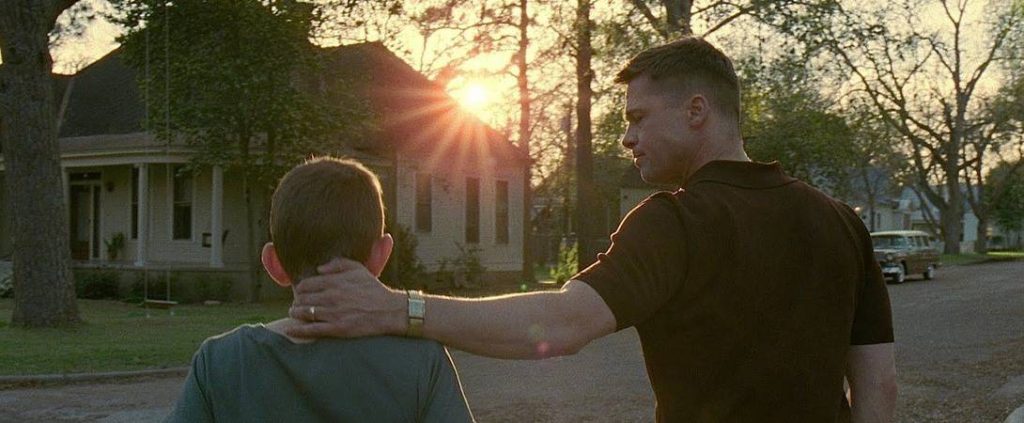
Yes, it’s the film in which Brad Pitt co-stars with a dinosaur. But The Tree Of Life is as far from a popcorn blockbuster as they come — in fact, one might call it ‘Jurassic World: Rumination’. In Terrence Malick’s deep-thinking drama, described by one Catholic magazine as “a philosophical exploration of grief, theodicy and the duality of grace and human nature” (it’s not got a lot of laughs), Pitt plays the father of three boys, whose frustrations in life (he went to work at a power plant instead of pursuing his passion for music) are taken out on his kids. It’s one of the actor’s most measured and moving performances, as a loving man who can’t stop himself hurting those closest to him. And it came about by chance: a producer on the film, Pitt stepped in when Heath Ledger had to drop out because of illness, just a month before his tragic death.
Burn After Reading
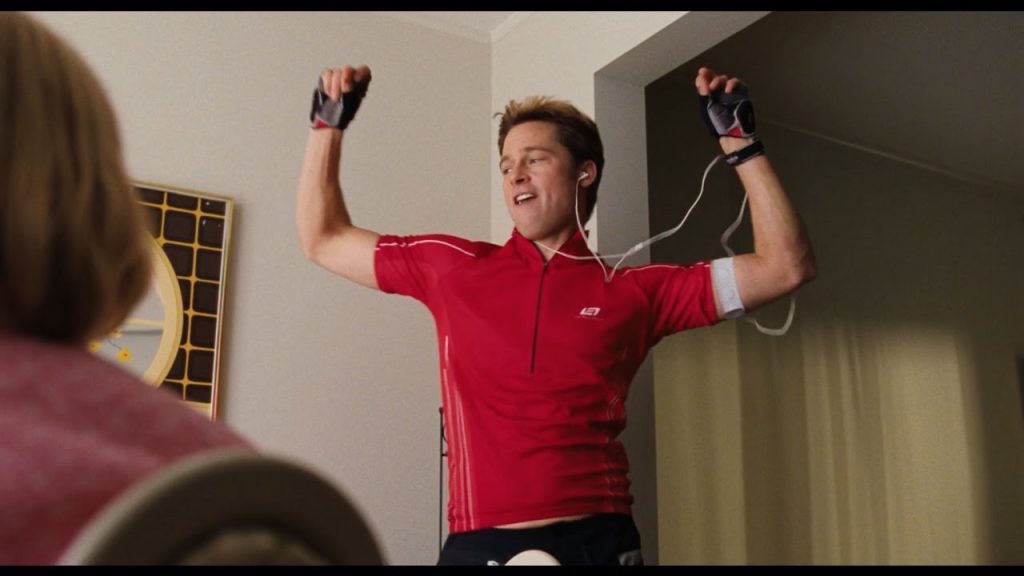
The Coen Brothers’ shaggy-dog satire about misplaced intelligence delivers that rare thing: Brad Pitt as an out-and-out doofus. Playing wildly against type, he’s a hoot as airheaded Gatorade-chugging gym-dude Chad Feldheimer, who comes into possession of CIA analyst Osbourne Cox’s memoir, which he mistakenly believes is a document of sensitive information. Cue an excruciating extortion attempt over the phone as Feldheimer tries to secure himself a reward, his complete daffiness and lack of guile butting up against the quiet fury of John Malkovich’s Cox: “I thought you might be worried.. about the security… of your shit!” From his no-thoughts facial expressions, to his loose-limbed dance moves, to his toilet-brush-style bleached hair, this is a hilariously different type of Pitt performance – and one that proves how adept he is at comedy when given the chance. His dopey charm makes it all the more shocking when Chad (SPOILER ALERT) gets brutally killed in the final act, going out with a big cheesy grin still plastered on his face.
12 Monkeys
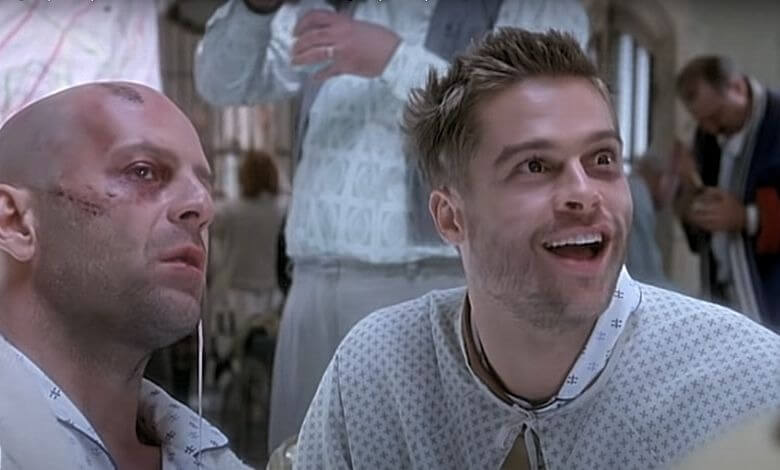
An early example of Pitt attempting not to be a heartthrob – he’d recently played quite the vicious redneck in Kalifornia – he went full box-of-frogs in one of Terry Gilliam’s most accessible (and entertaining) offerings. As Jeffrey Goines, a patient at the Baltimore mental institution in which Bruce Willis’ time traveler unfortunately finds himself, Pitt basically performs his own one-man-play here, dining out on erraticism, yelling and hollering, constantly vibrating, perpetually moving, eyes either squinting or rolling around his head, limbs waving, hands scratching… the works. Spitting fractured counter-culture diatribes, he is a wired, twitchy, jerky concoction, somewhere between Dennis Hopper in Apocalypse Now and Michael Keaton’s Beetlejuice, shot by Gilliam like a cartoon character, with comedy sound-effects intermittently soundtracking his movements. Not a subtle performance, then, but a whole lotta fun.
Once Upon A Time… In Hollywood
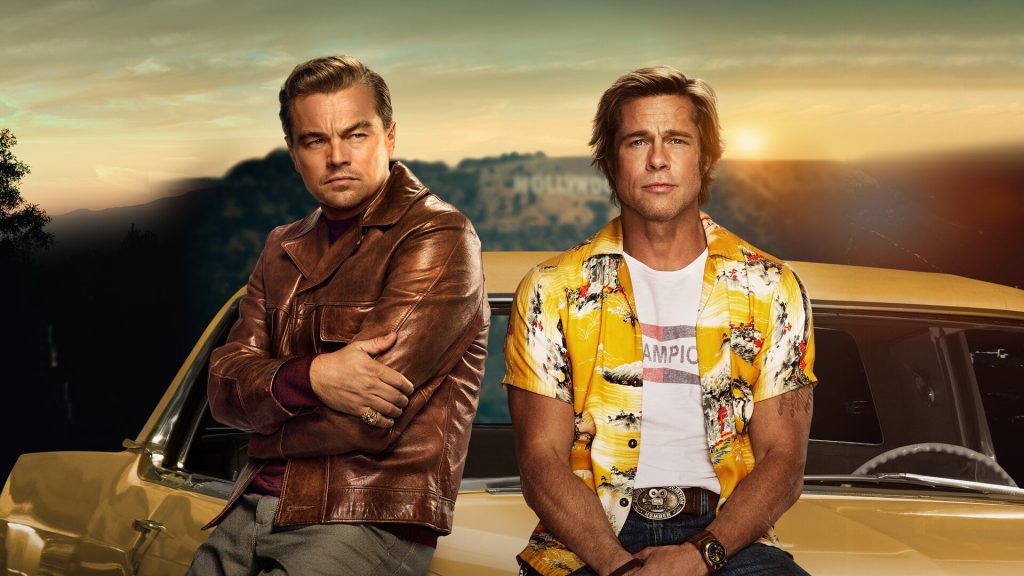
Here’s a testament to the pure power of Pitt: he can take a character called Cliff Booth (the name of someone who might work down your local B&Q), and not only turn him into a believably kick-ass Hollywood stuntman, but earn Oscar gold for it. He won Best Supporting Actor for his role as the ultra-laidback stunt double of Leonardo DiCaprio’s Rick Dalton in Quentin Tarantino’s fairytale ode to (and alternate history of) the dying days of Golden Age tinseltown – and it’s easy to see why. All of Pitt’s natural charm and charisma are channelled into Booth’s lackadaisical demeanor — a steady pair of hands who not only helps Dalton out in the action sequences but provides personal companionship and emotional guidance to his unsteady co-star, too. Oh, and he’ll change his TV aerial, shirtless on a rooftop. Maybe that contributed to the gold statue. This was Pitt’s return to the big screen after a few years away from the limelight and it sent him into a new, exciting phase of his career: the king of cool on a real comeback.
Inglourious Basterds
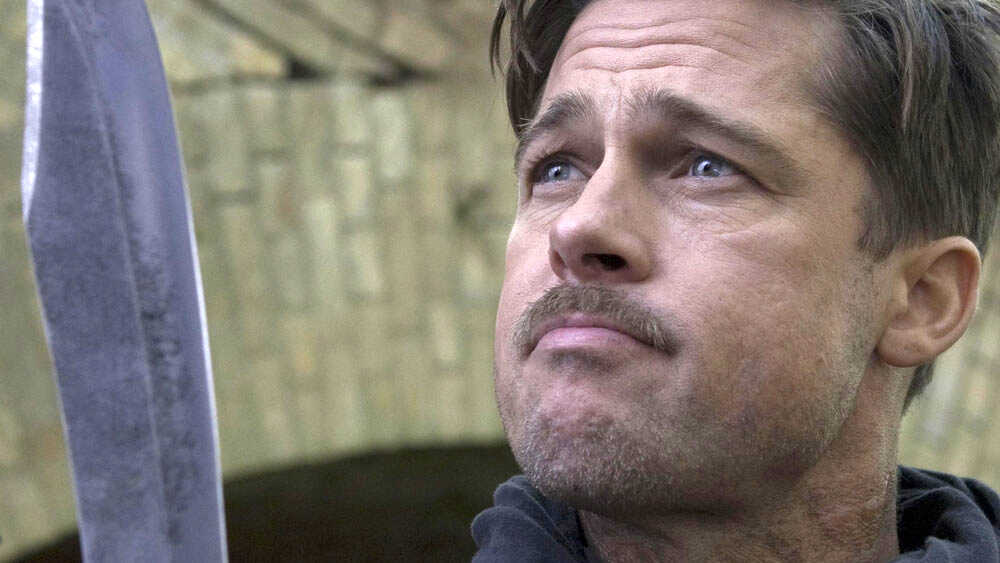
Despite being the central figure of the titular Basterds, Brad Pitt’s Lieutenant Aldo Raine isn’t the main character of Quentin Tarantino’s World War II alt-history, but he is its biggest injection of fun. With full movie-star swagger, he stomps in with a crewcut and cigar in his mouth to play an all-out pulp hero who loves nothing more than scalping Nazis. With his broad southern accent, no-shits-given attitude, and truly terrible grasp of Italian (“Bon-jyorrrno!”), Aldo Raine is a blast to watch from scene to scene – and Pitt proves more than adept at getting his mouth around Tarantino’s gloriously verbose dialogue. From his opening speech (“We’re gonna be doin’ one thang, and one thang only. Killin’ Nazis!”) to that final, brutally brilliant line (“I think this just might be my masterpiece,” he says as he slices a Swastika into Hans Landa’s forehead), he’s one of many reasons why Basterds stands as a highlight of QT’s latter career.
Fight Club
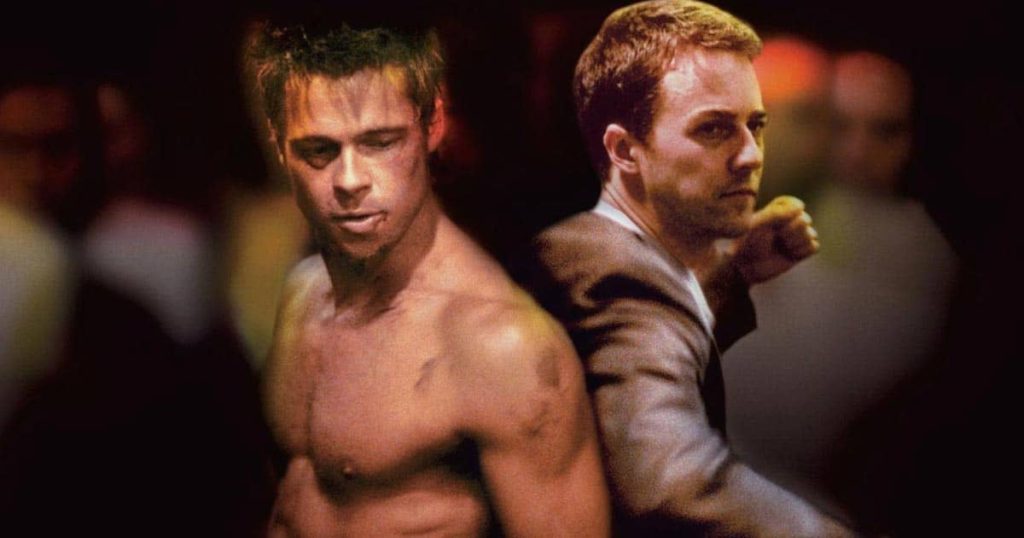
For the rest of his career, Brad Pitt will be inextricably linked to Tyler Durden. In David Fincher’s satire of capitalism and toxic masculinity (a notion that didn’t have that particular label at the time), Pitt’s character is the violent, unhinged, ultra-cool masculine ideal – a man who fights (duh), fucks, flips a middle finger to the establishment, and finally sends the whole thing up in flames. He’s everything, then, that Edward Norton’s ‘Jack’ isn’t, but wishes he was (or is he?). To believe in the central premise of the film, you need to really believe in Tyler – to be awed by how cool he seemingly is, to understand why ‘Jack’ would find himself in such thrall to a man so uninhibited and free-willed, and to be ultimately horrified by everything he represents. Pitt nails all of it, with an iconic jacket to boot. In the years since, he might have been co-opted by the worst kinds of people, but Durden remains a fascinating character; Pitt’s image remains central to his appeal, but his performance perfectly embodies all the reasons he’s no hero. A very different kind of soap star.
Se7en
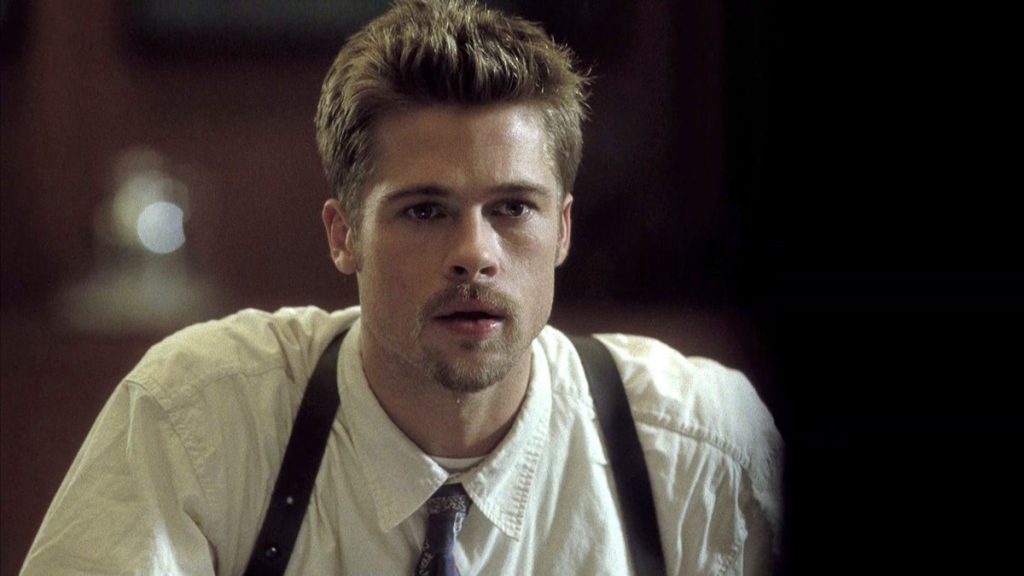
Brad Pitt’s first collaboration with David Fincher still stands tall as one of the greatest serial-killer thrillers of all time – a masterful and macabre trawl through the seven deadly sins, in which Pitt’s idealistic, up-and-coming Detective David Mills attempts to solve a series of grisly murders with Morgan Freeman’s old-timer Detective Lieutenant William Somerset. All the pep and drive of Pitt’s early performances can be found here – you feel Mills’ desire not just to solve the crimes, but to remain uncorrupted in a world of sin, in part thanks to Fincher’s focus on completely humanising his central duo. That goodness remains until Mills comes up against ‘John Doe’, and finds himself utterly broken – there’s a reason why “What’s in the box?” has become the quote that Pitt says people still shout at him on the street. Sure, it’s memorable for being a shocking, brutal knife-twist in Se7en’s final act, but it’s also the horror and heartbreak in Mills’ voice that makes it connect — a man completely undone by the most harrowing acts of savagery.




























